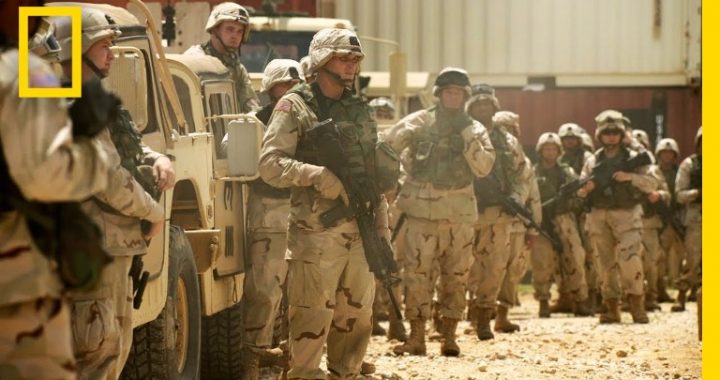Army Infantry Squad Leader Joshua York was in Sadr City on April 4, 2004 when all hell broke loose. Comanche Red Platoon was with 2nd Battalion, 5th Calvary Regiment (2/5) – the unit ambushed by forces loyal to Shi’ite Cleric Muqtada al-Sadr. “The Long Road Home ” is a miniseries that began on November 7 and is based on a book written by Martha Raddatz about the real battle for survival. The battle became known by some as “Black Sunday.”
The Reality of War
Joshua York began his 22 year military career in the US Marine Corps right out of high school. During his time as a Marine, he served during the US Embassy bombing in 1998. He eventually left the Corps as a Corporal.
Then he joined the US Army and was stationed at Fort Hood. After two years, the deployment to Iraq came. His experience as a Marine were skills needed… but he had no idea how needed they were about to become.
Starting off as an infantryman, the Army told him he’d be with “Bradleys” – Bradley M-2A3 Infantry Fighting Vehicles- on the deployment to Iraq. After figuring out what a “Bradley” was, he told us he was ready to test his skills.
“It was supposed to be a peacekeeping mission with nothing going on. I guess I was naive to think I was ready to test my skills. Hindsight is always 20/20.”
The 2/5 was the “second wave” – the replacement for another unit at Camp War Eagle outside the city. They had only been in Iraq since March, and assumed they had missed the fighting. They were wrong.
Countdown to Trouble
Josh told us that on Friday, April 2, the Army had shut down a newspaper loyal to Muqtada al-Sadr that was spouting anti-American rhetoric and advocating violence against the troops. They had moved their Bradley vehicles out to provide security for the operation.
By Saturday, the locals started massive demonstrations against the Americans. Palpable anger had replaced the initial feelings of thankfulness for Americans liberating the city from Saddam Hussein. What the 2/5 did not know, was that the Mahdi Army loyal to al-Sadr had already seized key Iraqi police positions throughout the city.
“It was a weird feeling.”
Sunday, April 4
Josh’s platoon was on a “routine” patrol, escorting “honey wagons.” As a squad leader, and due to some of their comms being down, he was working to get them up and running so was not with them at first.
“Suddenly they told me that my boys were in contact, so I gathered up the remaining platoon members and headed out to the fight.”
The “contact” was a bloody battle that ensued as 19 members of the 2/5 were surrounded and holed up in a house. At first, the 1st Cavalry Armored Division rescuers were unable to use their big guns due to the rules of engagement, and were pushed back by the attacks from the Mahdi Army that had taken over police positions. Eventually, the use of their firepower was granted when it became obvious they were all outnumbered.
“We all grew up very fast that day. The first man killed was a friend of mine, Sgt Chen. He babysat my son. He was in our platoon, but a different squad. All of us were very close- we’d been together for over 3 years. At the end of the day, we lost 8 men.”
The battle only began on April 4. After 4 years of on-again, off-again battles with the Madhi Army, a cease-fire agreement was reached that allowed Iraqi forces to enter the Sadr City neighborhood.
“Sadr City was the biggest gunfight since the fall of Baghdad.” General Martin Dempsey
*****
The Long Road Home is a miniseries on the National Geographic Channel that airs on Tuesday nights at 10 EST/9 CST. We asked Joshua if it was an accurate rendering of the battle – surprisingly, he said “Yes.” The book was written by Martha Raddatz, a reporter with ABC news and their Chief Global Affairs Correspondent, in 2008.
Joshua said he was fortunate to meet the actors involved in the show, and even the one who played his friend, Sgt Chen. He said it was “surreal” to watch The Long Road Home, and how realisticly the cast portrayed everyone.
“They got it right – regular guys from all walks of life were put into extraordinary situations. And they all ran toward the danger. They told our story well. For me, I have to thank the Marine Corps for the training they gave me that got me through it.” Josh York
York is currently a Captain with US Army Medical Activity Bavaria. He oversees 5 medical treatment facilities all over Germany, plus one in Romania.
Featured photo: Screenshot from NatGeo’s The Long Road Home on You Tube
Originally published at Uncle Sam’s Misguided Children.
